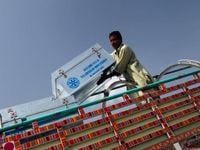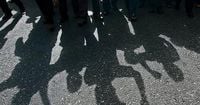On October 2, 2025, the National Press Club (NPC) in Islamabad, long regarded as a bastion of free speech and independent journalism in Pakistan, became the center of a storm that has shaken the country’s media landscape. Television broadcasts and eyewitness accounts showed Islamabad police, armed with batons, storming the press club’s grounds to break up a protest organized by the Jammu Kashmir Joint Awami Action Committee (JKJAAC). What followed was a scene that many journalists called one of the darkest in Pakistan’s recent history: police attacking journalists, dragging people, and attempting to seize cameras and mobile phones—all on the hallowed grounds of the NPC.
This incident, as reported by Dawn and other major outlets, has drawn fierce condemnation from journalists, civil society groups, and human rights organizations nationwide. The immediate cause of the police action was a demonstration called by the JKJAAC, which has been active in protests in Pakistan-occupied Kashmir. According to Shiraz Gardezi, a journalist with Geo News and Senior Joint Secretary of the NPC, the police surrounded the protesters as soon as the demonstration began. Gardezi, who was present to cover the protest, described the chaos: “Because they were torturing, beating, and dragging people,” he alleged, “police attempted to seize mobile phones and cameras from journalists.”
Television footage confirmed these claims, showing officers wielding batons and attacking not just protesters, but also journalists and press club officials who tried to mediate. The president of the Pakistan Federal Union of Journalists (PFUJ), Afzal Butt, recounted at a press conference that press club officials attempting to act as intermediaries were subjected to “beatings and torture.” Two individuals were arrested during the raid, though they were later released.
The fallout was immediate. Interior Minister Mohsin Naqvi, expressing concern over what he called an “unfortunate” event, ordered a comprehensive inquiry and demanded a full report from the Islamabad inspector general of police. “Violence against the journalist community cannot be tolerated under any circumstances,” Naqvi stated, echoing the sentiments of many who watched the disturbing scenes unfold.
Minister of State for Interior Talal Chaudhry joined in the condemnation, apologizing for the incident and describing it as a sudden occurrence. “Some people from the [JKJAAC] were protesting [and] some of their people had manhandled police personnel,” his office explained in a statement. “When they tried to arrest these people, the police chased them. The police came to the Press Club to arrest the protesters who misbehaved with [officers].” Nonetheless, Chaudhry ordered an internal inquiry and offered to meet with journalists to discuss their concerns after they had convened.
The PFUJ wasted no time in announcing an emergency session to formulate demands for the government, aiming to prevent future incidents of this nature. “We will also decide our course of action and announce it after the meeting,” Butt said. The PFUJ, along with the Council of Pakistan Newspaper Editors and the Association of Electronic Media Editors and News Directors, issued a joint statement labeling the raid as “terrorism” and demanded swift action against those involved. The Lahore Press Club called on Prime Minister Shehbaz Sharif to suspend and arrest the police personnel responsible.
Journalists’ unions and associations have responded with unity, holding a press conference at the NPC and scheduling a “black day” for October 4, 2025, to protest the attack. Tariq Virk, President of the Rawalpindi-Islamabad Union of Journalists, emphasized the need for national unity among journalists in the face of such threats. The Human Rights Commission of Pakistan (HRCP) also condemned the “assault on journalists by Islamabad police” via a post on X, demanding both an inquiry and accountability for those responsible.
Yet, the raid on the NPC was not the only event to raise alarm bells about the state of press freedom in Pakistan this week. Just days before, on October 1 and 2, the Ministry of Information published a half-page advertisement in several leading newspapers, warning that the battlefield of war has shifted “from guns to information.” The ad, under the provocative headline “Have you ever wondered what war looks like today?” suggested that today’s enemy “may appear in the guise of a reporter, an NGO worker, or a freelancer,” and could extract sensitive information “to create fear and unrest.”
This government messaging, as reported by Dawn, has sparked outrage from press freedom advocates and human rights organizations. The Freedom Network, a prominent media watchdog, condemned the advertisement in strong terms, warning that it placed journalists and civil society workers in danger by equating them with threats to national security. “This reckless narrative undermines press freedom, fuels hostility, and stigmatises professionals who deliver reliable information to the public,” the organization stated.
Other groups, including the HRCP, the Women’s Action Forum (Lahore), Shirkat Gah-Women’s Resource Centre, South Asia Partnership-Pakistan, Simorgh, and the Centre for Legal Aid, Assistance and Settlement (CLAAS), issued a joint statement denouncing the Ministry of Information’s move as “deeply troubling.” They stressed that the ad further narrows Pakistan’s already restricted space for free speech and independent media.
Critics pointed out that the campaign coincided with the government tightening controls on digital platforms, particularly following the imprisonment of an opposition leader. Rights advocates fear that the ad’s messaging could embolden hostility against journalists, freelancers, and NGOs, making them more vulnerable to harassment and violence. “By casting independent voices as ‘enemies of the state,’ the government risks legitimizing attacks on democratic freedoms,” warned one rights group cited by Dawn.
The timing of both the NPC raid and the controversial government advertisement has reignited debates about censorship, repression, and Pakistan’s shrinking civic space. Social media has been flooded with posts from journalists and activists denouncing the assault and warning of a chilling effect on independent reporting. The HRCP, echoing widespread sentiment, demanded “inquiry and accountability for those responsible.”
Information Minister Attaullah Tarar described the NPC incident as “regrettable” and pledged a thorough investigation. However, many in the media and civil society remain skeptical, pointing to a pattern of increasing pressure on journalists and independent voices in recent years. The events of early October 2025 have only deepened concerns about the future of press freedom in Pakistan.
As the country marks a “black day” in protest, the message from journalists, editors, and rights defenders is clear: the right to report, to question, and to speak truth to power is not just a professional privilege, but a cornerstone of democracy. Whether the government’s promised inquiries and apologies will translate into meaningful reform remains to be seen, but the resolve of Pakistan’s journalistic community to stand united—and to keep reporting—appears undiminished.


